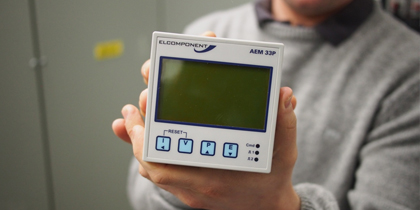
30 June, 2014, by Gemma Morgan-Jones
Sustainability In The Workplace
Speakers: Dr Ben Bedwell and Dr Caroline Leygue, Horizon Digital Economy Research Institute
Rising energy costs are having a considerable impact on businesses. Energy consumption, particularly from lighting and heating, accounts for a considerable proportion of the monthly spend of workplaces across the UK. Yet despite often being treated as fixed costs, the expenses incurred from energy use in the workplace can be greatly reduced by utilising the right technology and by understanding how to motivate staff to reduce energy use.
On 25th June, 11 delegates from East Midlands businesses and organisations gathered for a special event on Sustainability In The Workplace, funded by the European Regional Development Fund. This half-day workshop was part of a programme of events for EU Sustainable Energy Week and was designed to provide an insight into how smart meter technology could help to counter our problems with rising energy costs.
The session was delivered by Dr Ben Bedwell and Dr Caroline Leygue from The University of Nottingham’s Horizon Digital Economy Research Institute. Horizon looks at how digital technologies are changing our lives and the way we do business. Ben and Caroline are investigators on the Creating the Energy for Change project funded by EPSRC, which is exploring innovative ways of dividing up and representing energy use in shared buildings to motivate occupants to save energy.
What makes a smart meter smart?
Dr Ben Bedwell kick started the session with his overview on how smart meter data can help us save energy. Smart meters are going to be a sea-change in the way we capture data about how we use energy. For starters, they are connected to the internet, so with a smart meter there are no more meter readings and no more estimates. Your energy supplier can read your meter remotely and capture very accurate data about your energy use. Because smart meters are read every 30 minutes rather than once per year, our energy bills can become far more accurate and there’s even the scope for tailored contracts to suit our specific needs.
What can a smart meter tell us?
Ben invited the group to look at different ‘energy profile’ graphs generated from smart meter data, starting first with a domestic example then moving on to an example from the workplace. Whilst it was easy to distinguish the causes of the peaks and troughs on the domestic example, the workplace example proved a more complicated picture.
With multiple energy consumers in a workplace, there is far more ‘noise’ within smart meter data and individual events can be harder to pinpoint. However, it is still possible to identify anomalies that don’t correlate with the energy use pattern we would expect, like energy use outside of normal working hours. We can connect smart meters to sub-meters that can help to identify the cause of the problem.
Energy auditing
Ben guided us through a number of examples of energy profiles for gas, electricity and lighting. We worked together in groups to predict what we thought the energy profiles for each type of energy use should look like and then compared our guess work to real-life scenarios. As we became more accustomed to spotting anomalies, the idea of using smart data to audit our energy use became much more tangible.
Ben highlighted the problem of forgotten consumption: seldom-used devices languishing in a cupboard, quietly and pointlessly consuming energy. Then there’s unauthorised consumption, illustrated by Ben with a real-life example of a secret desk fridge! Technical inefficiencies play a role too, with old boilers and old lights unnecessarily increasing energy consumption. But of course, the hardest thing of all to change is process inefficiencies: our own behaviour.
Can staff be motivated by smart meters?
If behaviour is the most difficult factor to change in reducing workplace energy use, how can we encourage staff to save energy? Dr Caroline Leygue had some suggestions to offer based on Horizon’s recent research.
Caroline first reflected on the difference between motivations to save energy at home and our motivations to save energy in the workplace. One of the prime reasons to save energy at home is to reduce our energy bills. However, the cost motivation doesn’t necessarily translate to the workplace where there is no direct cost to the employee.
Altruistic behaviours
Aside from the purely altruistic motivations for saving energy like concerns for the environment, research has shown that pro-social behaviour can be personally beneficial. For example, donating blood or volunteering makes people feel good about themselves. Saving energy in the workplace can create the same ‘warm-glow’ feeling. It can also be used as a self-promotional tool, making the individual look good in front of colleagues and superiors.
Horizon’s research has found that campaigns to encourage staff to save energy in the workplace are more effective when they focus on the benefit to the individual.
Energy displays
Caroline wrapped up the day by looking at the use of energy ‘displays’ in the workplace and the pros and cons of using such devices to highlight energy use on a team or individual level. Displaying energy use in terms of C02 emissions, rather than financial cost or kWh, was found to be the most effective way of encouraging energy saving behaviours.
Our sincere thanks to Dr Ben Bedwell and Dr Caroline Leygue for delivering an engaging, interactive session that clearly impacted the delegates who attended.
No comments yet, fill out a comment to be the first

Leave a Reply